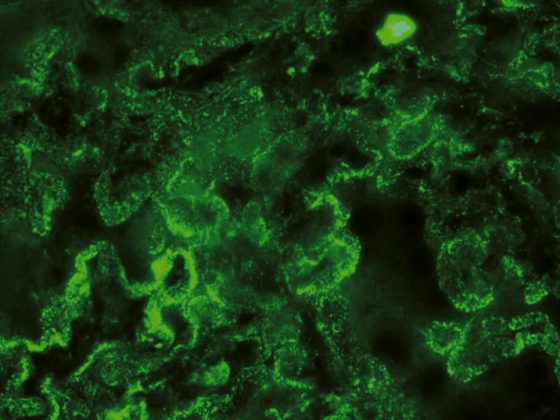What is certain: The survival prognosis of metastatic castration-resistant prostate cancer (mCRPC) has improved – on average from just over one (before 2000) to almost three years [1]. Nevertheless, current therapeutic approaches, whether hormonal or chemotherapeutic, eventually lead to resistance, making it all the more important to better understand the tumor microenvironment. This could explain resistance developments and define new therapeutic targets.
(ag) The prostate cancer microenvironment drives the growth and spread of cancer cells via suppression of the immune response. Currently, some cellular and molecular components of this process are already known, e.g., myeloid-derived suppressor cells (MDSCs), tumor-associated macrophages (TAMs), toll-like receptors (TLRs), and the pro-inflammatory protein S100A9.
Agents that have been shown to regulate the tumor cell microenvironment include ipilimumab (anti-CTLA4) or sipuleucel T (autologous cell inoculation). The latter agent is the only immunotherapy that has shown improvement in overall survival in mCRPC [2]. Results on ipilimumab are less promising in this respect and should rather be seen as an impetus for further research [3]. Tasquinimod was also able to enhance the anti-tumor immune response and affect the accumulation and function of MDSCs in preclinical models – and it did so by binding to S100A9. The active ingredient has therefore now reached development phase III.
Bones also relevant
The microenvironment in bone can also be used therapeutically. This is particularly relevant because very many patients with prostate cancer suffer bone metastases. Denosumab, a RANKL inhibitor, has been shown in clinical trials to delay the time to the first skeletal-associated event (e.g., fracture, bone surgery, radiotherapy) [4]. However, a benefit for overall survival has not yet been shown. Radium-223, an alpha emitter with high bone affinity, delays the occurrence of bone metastases and, in contrast, significantly improves overall survival.
Literature:
- Rathkopf DE, et al: Updated Interim Efficacy Analysis and Long-term Safety of Abiraterone Acetate in Metastatic Castration-resistant Prostate Cancer Patients Without Prior Chemotherapy (COU-AA-302). Eur Urol 2014 Mar 6. pii: S0302-2838(14)00185-7. [Epub ahead of print].
- Kantoff PW, et al: N Engl J Med 2010 Jul 29; 363(5): 411-422.
- Kwon ED, et al: Lancet Oncol 2014 Jun; 15(7): 700-712.
- Fizazi K, et al: Lancet 2011 Mar 5; 377(9768): 813-822.
Further reading:
– Bellmunt J, et al: European Oncology & Haematology 2014; 10(1): 51-57.
InFo ONCOLOGY & HEMATOLOGY 2015; 3(1): 2.











